Issue 122: The Reading Life of... Charlee Brooks
On late starts, building a life around reading and the intoxicating magic of bookish friendship 🥹🥹🥹
I read the way a person might swim, to save his or her life. I wrote that way too.
— Mary Oliver
is one of my internet friends who instantly felt like a real-life one. We first connected on Instagram and I remember the exact feeling: Wait—are we reading from the same invisible syllabus? We kept saying to each other — omg I just read this book and I loved it OR omg I really want to read this soon … It was starting to feel uncanny. Are you in my brain?! Are we made from the same reading stardust?! One of our earliest conversations was about how we each seemed to have found our long-lost reader twin. It felt so exciting!
Charlee has built a beautiful life around reading—not as a flex (although… let’s be honest, readers are the sexiest people alive)… but as an act of devotion, self-preservation and self-discovery. More than anyone else I follow online, he reminds me to make space for stillness, beauty, my weird little hobbies, my books, my journals, my lipstick. What moves me most about Charlee’s reading life is that it wasn’t inevitable. It came later. It was chosen and it was fought for. And I believe that when you choose reading—when reading becomes a way to find yourself, when it offers both solace and spark—it gets into your bones differently. Charlee’s reading life is messy and joyful, distracted and deeply intentional, full of tenderness and total heart.
If you’ve ever felt like a late bloomer, if you’ve wrestled with screen time or self-doubt, if you’ve longed for a book friend who just gets it—this one’s for you.
Tell me a little bit about yourself. Are books and reading part of your professional life?
I want to preface this by saying how incredibly lucky I feel to be doing this right now. When you asked me, Petya, if I’d write something up for A Reading Life, I screamed. Honestly. It was a full fan-girl moment—I won’t lie. This community you’ve cultivated is nothing short of astounding, and I look up to you a huge amount—as a reader, as a writer, and of course as a human. So thank you, deeply, for letting me be part of this.
PKG: 🥰🥰🥰
I had a feeling you’d ask me this question, and I’ll admit—I found it really hard to answer. We’re asked every day, in different ways, who we are and what we stand for. But I think this is the first time in my adult life I’ve sat down and tried to put it into words.
I grew up in a sleepy little town on the Victorian coast of Australia. Life was slow and quiet. I spent most of my childhood outside, playing on the street with friends, swimming in the ocean. It was an idyllic place to grow up, and I feel so lucky to have come from that kind of calm, grounded start.
But like many people, things got harder as I got older. My teenage years were marked by a deep struggle with anxiety, gender, and sexuality. I withdrew a lot. I was angry, hurting, and probably not very pleasant to be around. Looking back now, at the statistics and the spaces my body occupied during those years, I honestly feel lucky to have made it through. I did so because I had people—friends, family, and a community that allowed me to be whoever I needed to be. I’ll never stop being grateful for that.
You might think this is the part where I say books saved me—but the truth is, I wasn’t much of a reader growing up. My mum, a huge reader herself, tried everything to foster a love of books in us. She bought us books we swore to read (and never did), took us to the library, and always encouraged bedtime reading. But I only read what was required of me. I wasn’t the kid sneaking a torch under the covers for one more chapter. In fact, in early primary school, I was behind in my reading and had extra learning support.
It wasn’t until university that everything changed. Those years were transformative for me. I started to come out of my shell, found a community of people like me, and began experimenting with how I expressed myself. I was looking for stories that reflected who I was becoming, and that’s when I turned to books. I vividly remember the first one I read in my adult life was Call Me By Your Name, and it sent me into a full-on gay crisis—in the best way. That book cracked something open in me. If I hadn’t picked it up, I think my life would look very different today.
At the time, I was studying paramedicine. Not because I felt called to it, but because it seemed like a solid job at sixteen—and my mum’s a nurse. By the third year of my studies, I had found people I loved, was reading more than ever, and deep down, I knew I didn’t want to be a paramedic, though I hadn’t admitted it to myself yet. Around that time, I started posting book reviews on TikTok. I’m not even sure why, maybe because I’ve always been an iPad kid at heart, or maybe because it felt like a natural way to join the conversation, to feel seen. I think we all want that, deep down: to connect, to be understood.
Over the years, those silly little book videos started gaining traction. Eventually, they opened doors I never thought possible. At the beginning of this year, I made the scariest—and best—decision of my life: I left my full-time job as a paramedic to pursue a career in books and content creation. It still feels wild to say that out loud. I have moments of fear about how uncertain it all is, but I’m also deeply trusting in my happiness.
PKG: You can follow Charlee on TikTok, YouTube, Instagram and Substack.
Now, I’m incredibly lucky to say that books are my life. Reading shapes both my personal and professional world. I get paid to talk about books on the internet, I work part-time as a bookseller, and I read constantly—not just because it’s my job, but because I need to. I need books the way I need air or water. They move through me like blood. If they stopped, I think I might too.
On an average week, how much do you read and when?
Reading, for me, has always moved and changed like the seasons. For a long time, I struggled with that. I’d pressure myself to read constantly—to finish books I wasn’t enjoying, to hit some arbitrary number, to maintain an image online. I became overly critical, harsh even, toward myself as a reader.
But this year, something shifted. I made a vow to be more gentle with myself and with my reading life. I want to be a reader for life, and to do that, I need to create habits that feel sustainable, nourishing, and true. Around the same time, I also became aware of just how much time I was spending doomscrolling. My screen time was out of control. It had become instinct to reach for my phone, and I knew something had to change.
Between that awareness and a big shift in my professional life, I’ve ended up reading more than ever, but now it feels like a joy again. It feels inspired and much more sustainable.
PKG: This is all music to my ears. Being part of a book community online is so nurturing and inspiring… until it’s not. The pressure to read more and read the right books is very real. So, please, let Charlee and I be your book friends to tell you: chill a little bit about this; your reading life is yours alone and you need to protect your reader heart.
I don’t track exactly how many hours I read in a day—it changes depending on what’s happening in my life—but I’ve noticed my reading tends to fall into three main rhythms: breakfast, the interstitial, and before bed.
Anyone who follows me on Instagram knows I’m deeply devoted to my morning ritual. Every day, without fail, I post a photo of my breakfast and whatever book I’m reading. I’m not religious, but if I had a form of devotion, that would be it. There’s something so tender about making yourself a beautiful breakfast and sitting down to enjoy it slowly, with a book. What I read varies, but often it’s poetry—something quiet and beautiful to shape the beginning of my day. It sets the tone for everything that follows.
Then there are the interstitial moments—the small, in-between pockets of time that used to disappear into the ether of notifications. You once wrote about time confetti, and that image stuck with me. Since then, I’ve been trying to reclaim those scattered bits of time. On the train, in line, waiting for an appointment—if there’s a moment, I try to reach for my book instead of my phone. It’s made a bigger difference than I ever expected.
PKG: Quick note to everybody who has mentioned to me that they can’t read this way because they need more time to focus. PRACTICE interstitial reading! It will be super hard at first but the more you do it, the more you will find that little by little your focus is coming back! It’s THE ultimate jedi mind-trick and it will totally help reduce your screen time.
And finally, there’s night-time. The real bulk of my reading happens then. I don’t watch much TV, and most nights I’m in bed by eight, curled up with a book. Sometimes I fall asleep after a page or two, but often I read for hours. It’s a small act of kindness to myself, and one I genuinely can’t live without. I heard my dear friend Rumaan Alam speak at the Melbourne Writers Festival recently, and he said he can’t fall asleep unless he’s read something, even just one page. I felt that deeply.
So yes, I read a lot. Probably too much. All the time. But I love it—chaotically, endlessly, dearly.
What do you like to read? Has your taste changed over the years?
My reading journey began as a search for other bodies like mine. I was reaching toward stories that could hold my experience, reflect it, name it. That remains true—but over time, I’ve also found myself drawn toward lives I’ll never live, toward voices and experiences that expand the boundaries of what I understand.
I’ve often likened my reading life to the circulatory system. Bear with me. It’s intricate, alive—a living, breathing thing full of endless patterns, movement, complexity. It’s constantly shifting, evolving, bifurcating. Never finished arriving. Every time I read something new, I’m sent down a fresh pathway: a concept I’ve never encountered, a reference to another book, a writer I’ve never heard of. One branch leads to another, and then another. It never stops.
The books I gravitate toward have evolved, of course, shaped by time, curiosity, and the people around me. My online community plays a huge role in this. The friends I’ve made there are constant sources of inspiration. I remember stumbling across your account, Petya, through our mutual friend , and immediately knowing I wanted to be in your orbit. It’s a kind of magic, isn’t it? That someone so far away—geographically, experientially—can have such a profound impact on your inner life simply through a shared love of language. I have so many people like that now, and they guide, challenge, and expand the way I read.
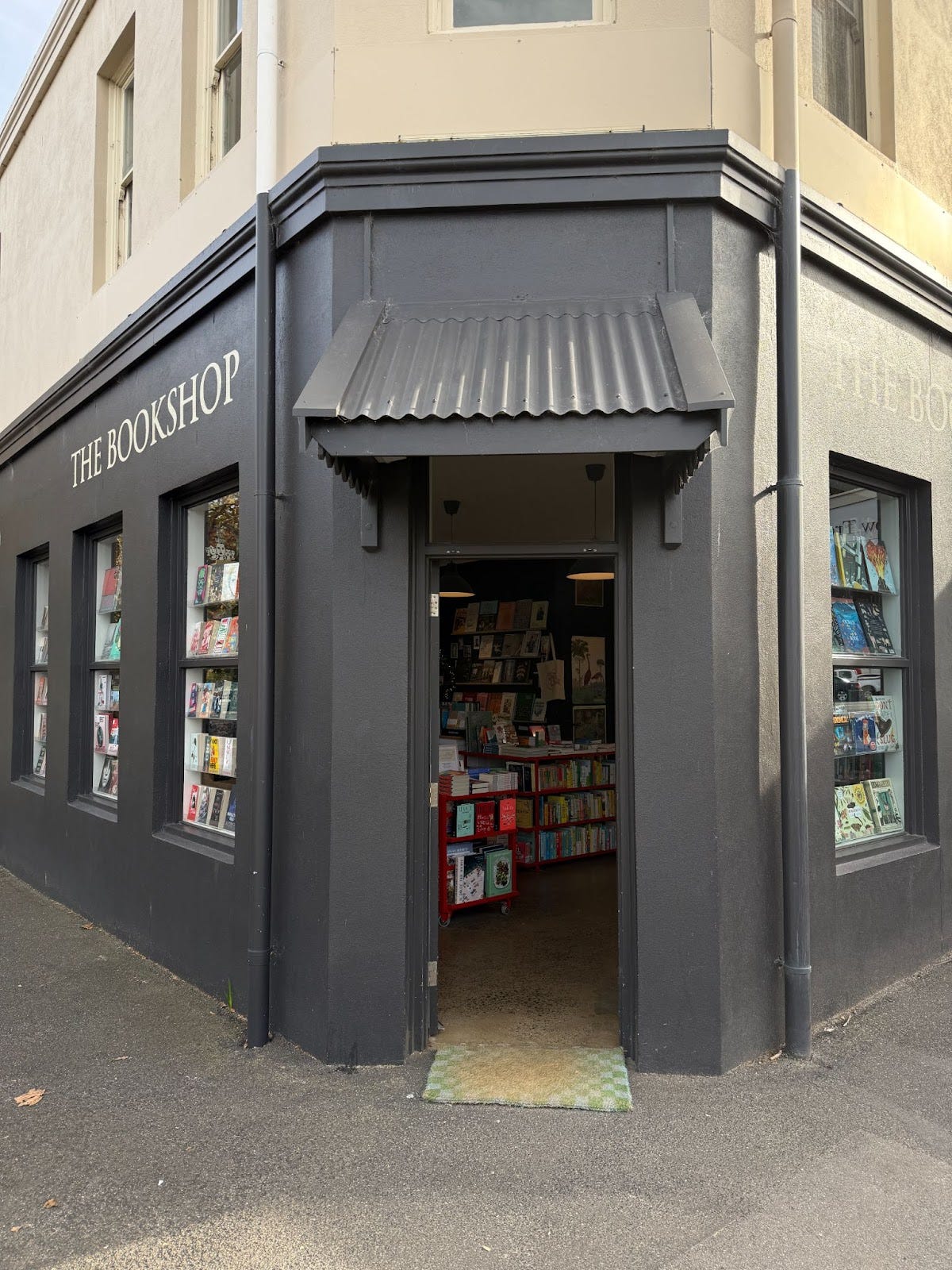
Working part-time in a beautiful bookshop has been one of the most transformative forces in my reading life. (Yes, I still buy far more books than I should.) In a world increasingly shaped by algorithmic suggestion, it’s rare to walk into a space and be genuinely surprised by what’s on the shelves—but this shop is different. Matt and Jayne, the owners, have created something truly special: a place where discovery feels not only possible but inevitable. It’s a carefully curated collection that prioritises voices from the margins and books that challenge and delight in equal measure. Being surrounded by that kind of thoughtfulness has reshaped the way I choose what to read. I’ve found myself reaching for titles I might never have encountered online, and falling in love with new writers and ways of thinking.
My colleague Yasmin, who has also become a dear friend, has played a huge role in that evolution. She’s the kind of reader who makes you want to be better—more intentional, more expansive, more curious. Our conversations across the shop counter have been some of the most enriching of my reading life. She challenges me not only to read more broadly but to really sit with what I’m reading, to ask questions of the text and myself. Her influence has helped me sharpen my critical thinking and deepen my engagement with books. A huge part of how my taste has broadened in recent months is thanks to her and to the kind of environment this bookshop makes possible.
That said, queer fiction still owns my heart—and I don’t think it’ll ever give it back. It was my first love. But as I’ve matured as a reader, and as my comprehension and capacity have grown, I’ve found myself reaching more for essays, theory (particularly around gender and art), and, increasingly, poetry.
If I had to distill my reading taste right now, I’d say it revolves around a hunger to understand language. How it works. How it sounds. How it has been used—and how I might use it better, more intentionally, to shape the world I want to see.
I want to be challenged, constantly. And I think I’m enjoying that.
So yes, my reading taste has changed enormously over the years—because I have changed. But that’s what I love about reading: it grows with you, and sometimes, if you’re lucky, it grows you too. The books I reach for now might look different from the ones that first pulled me in, but the impulse is the same: to understand myself and the world more deeply, more compassionately, and with greater imagination.
What's a reading habit you've developed that's unique to you?
Being so deeply involved in the online reading community, I consume a lot of content about what people read and how they read. So when I first saw this question, I didn’t think there was anything particularly unique about the way I read. I sat with it longer than I probably should have—and then I landed on one very specific, slightly strange answer.
I always read with music on. But not just any music. Specifically, the original score from The Andy Warhol Diaries, composed by Brad Oberhofer. I know it’s oddly specific, but it’s something I absolutely love. I started doing it last year after watching the series on Netflix and never anticipated just how much it would change my reading life. The music is all about atmosphere and drama—it’s beautiful, thoughtful, and full of feeling. Listening to it makes me feel like the main character in whatever story I’m reading, adding a cinematic layer that elevates the entire experience.
Eventually, I built a playlist inspired by the album. It’s called Becoming, and it’s filled with hours of classical pieces that carry a similar emotional weight and texture.
I listen to it not only while I read but also while I work—it brings a kind of quiet theatre to my day. But the Warhol Diaries score remains the anchor. It’s the one thing that holds me like nothing else can. So there you go—a slightly dramatic, oddly specific, and very cherished ritual in my reading life.
Do you take notes while you read? If yes, are you particular about your materials - notebooks, pens, highlighters vs. pencils, etc?
One thing about me is that I’ve always had an obsessive personality—a trait my siblings and I inherited from our father. So naturally, when I started reading, I became completely absorbed. I wanted to suck the marrow out of every sentence, every detail, every nuance.
Annotation has been a constant in my reading life. But when I say annotate, I don’t mean colour-coded highlights and sticky notes like we did in high school. I mean messy, instinctual markings—underlined sentences (sometimes whole pages), dog-eared corners, notes scrawled in the margins, stars and question marks forming a kind of secret language. The way I treat my books has always sparked debate online. If I had a dollar for every time someone got upset about it, I’d be rich. But I believe books are meant to be used. To be lived in. I don’t want a shelf full of untouched artifacts—I want a library of worn, loved objects, bursting with life. Books should breathe. I want mine to tell a story of how they moved me, how I loved them and if that ruffles feathers, so be it.
PKG: I know it’s controversial and I have the DMs to prove it but I am with Charlee on this one. I love a beaten up copy of a book, it only means that it was IN your life, WITH your life.
As you know, Petya, I’m an absolute fiend for a journaling ecosystem. I love the idea of a journal that evolves alongside its owner, changing shape and purpose as we do. I’ve been lucky enough to work closely with Paper Republic over the past year, which has helped me create a system I genuinely cherish. At the heart of it are three notebooks that accompany my reading life.
1| First, there’s a general reading journal—where I track what I’m reading, jot down thoughts, reactions, stray impressions, and reviews. It’s chaotic and far from polished, but I love it. I much prefer having a physical archive of my reading life rather than relying on an app.
2| Second, thanks to your suggestion, I’ve started keeping two commonplace books: one for poetry and another for everything else. They’re still in their early, clumsy days, but I adore the practice. Copying down lines I want to carry with me forever feels like stitching the books into my body. It’s been such a joyful and grounding addition to how I read.
As for tools, I’m loyal to Moleskine notebooks—not because they’re trendy, but because they’re accessible, well-bound, and the paper just feels right. I use Muji 0.5mm ballpoint pens exclusively now. I didn’t believe the hype until they sent me a gift box… and now I’ll never go back. The writing experience is smooth as butter.
In the end, my note-taking isn’t about aesthetics or perfection—it’s about deepening my relationship with the text. It’s a conversation. A ritual. It’s how I remember, reflect, and keep the books I love close. More than that, it’s how I begin to truly understand a book—not just what it says, but how it says it, and why it matters. The act of writing things down, returning to them, sitting with them—it makes me a better, more critical thinker. It sharpens my attention, helps me read with greater care, and pushes me to engage with books in a way that feels lasting.
Where do you get ideas about what to read?
As I mentioned earlier, I’d be lying if I didn’t acknowledge the role the internet plays in shaping what I read. We’re living in a time where we have access to such a wide variety of reading tastes, perspectives, and brilliant minds—it’s kind of unprecedented. I feel incredibly lucky to be part of an online reading community where I’ve formed connections with people who truly understand and often share my literary interests. A lot of my recommendations come from BookTube friends, TikTok videos, and of course, from beautiful internet friends like you, Petya, who somehow know my reading taste better than I do.
My friend Yasmin, whom I mentioned earlier, has also played a huge part in my reading life lately. We’ve had so many rich conversations across the bookshop counter, and she’s constantly encouraging me to stretch myself and read more widely. She introduces me to things I never would’ve picked up on my own, but she also knows my taste so well. She’s become one of my reading role models, and whenever I feel a little stuck or uninspired, I go to her for a rec—and she never misses.
Finally, one of the most surprising and delightful sources of recommendations comes from the books themselves. It’s wild how often I’ll start reading something and suddenly find myself down a rabbit hole of references—authors mentioning other writers, artists, films, or ideas that spark my curiosity. One book can lead you to ten more. It feels like they’re all in conversation with each other, and that sense of literary lineage really excites me. I often jot down those references in my journal so I can look into them later. Some of my all-time favourite reads have come from a single sentence or shoutout buried in another book.
So whether it’s through online communities, trusted friends, or the pages of the books themselves, I’m constantly gathering threads of curiosity to pull on—and I never know quite where they’ll lead.
How do you decide what to read next? Are you a mood-reader or a planner?
If you haven’t gathered by now, I am not only a certified yapper but also a deeply committed mood reader. It’s actually kind of comical—every month, without fail, I make a video outlining my monthly TBR. And every month, without fail, I almost never stick to it. What can I say? The heart wants what it wants, and who am I to deny it that? Most of the time, I just wander into my little cellar (otherwise known as the office) and pick up whatever feels right in the moment.
Because of this, I’ve learned to let go of any guilt around abandoning books. I used to push myself to finish everything I started—usually in pursuit of some arbitrary reading goal—but I’ve realised that’s just not worth it. Not every book is going to meet me where I’m at, and that’s okay. There’s always another book that might. I trust that the right story will find me when I need it. So while I might make plans, it’s ultimately my mood—and a bit of intuition—that guides what I read next.
When people ask me how come I read as much as I do, I frequently just give them a list of things that I don’t do as regularly as I probably should: exercise, clean house, spend time with friends. What do you choose NOT to do in favor of reading?
There’s this running gag in my house that all I do is sit on the couch. And I won’t lie—it’s often incriminating when everyone leaves for their nine-to-fives and returns to find me in the exact same spot, still reading. What they don’t always see is the chaos that fills the in-between: filming, editing, chasing deadlines, and juggling brand work. So when people say, “I wish I had as much time as you to read,” it’s hard not to bite back just a little.
Before I answer this properly, I want to preface it by acknowledging my privilege. I read for a living. Books are, quite literally, my life. I don’t have school pickups, a boss breathing down my neck, or caregiving duties. I’m fully aware that I have a lot more freedom than many people. That said, I still make intentional choices—and sacrifices—to read as much as I do.
One of the biggest things I don’t do is watch TV. Last year, I watched two series—The Andy Warhol Diaries and One Day—both phenomenal. But beyond that, I’m mostly clueless. People will ask if I’ve seen the latest show, and nine times out of ten, the answer is no. It’s not that I don’t enjoy it, it’s just that I’d rather be reading. (That said, I will always make time for BookTube—my one true screen-based indulgence.)
Another shift I’ve made is cutting down my phone time—something that used to be a real problem. I was constantly scrolling, constantly checking, constantly plugged in. It started to feel like I was living inside a never-ending feed. My attention span shrank, I felt scattered all the time, and I was going to bed wired and waking up drained. So I started being more intentional: putting it on silent, turning off notifications, and leaving it in another room when I sit down to read. It’s not perfect—I still slip back into old habits—but I’ve noticed a huge difference in my ability to focus, absorb, and enjoy what I’m reading.
And then, there’s the socialising. I’m definitely not as social as I should be. After a week of events, meetings, and shifts at the bookshop, the thought of going out is often too much. I need alone time—quiet, slow, uninterrupted time—to reset. And for me, reading is part of that. I know I sometimes neglect the people I love in favour of that solitude, and I’m actively working on finding a better balance. But it’s a process.
I don’t drink, I don’t party, and I don’t have a particularly fast-paced lifestyle. I thrive in routine. In slowness. Some might call it boring—but it’s the life that makes space for what matters, and for me, that makes it rich.
Do you have any tips or advice for people who wish they were reading more?
I know I sound like a broken record, and I don’t blame you if you’re sick of hearing people talk about the phone—honestly, I am too—but it really does need to be said. I think every single interview in A Reading Life has mentioned it, and that’s because it’s true. The phone is the main reason so many people who “don’t have time to read” aren’t reading.
PKG: Literally. Every single one.
Our phones give us dopamine instantly. They’re fast, addictive, and always there. I completely understand wanting to melt into the screen after a long, exhausting day. I get it. It’s comforting, it’s passive, and it doesn’t ask much of you. Meanwhile, reading feels like effort. It’s quiet. It takes a second to get into. The buzzing, the notifications, the scrolling—it’s all designed to keep us hooked. And yeah, it almost feels silly to say, just put your phone away, but honestly, that’s the first step.
I’m not some productivity coach telling you to throw your phone in the ocean and wake up at 5am to read, but if you can put your phone on silent and leave it in the other room, even just for ten minutes, you’d be amazed at how much easier it is to actually read. It doesn’t have to be a huge thing—five minutes on the train, ten minutes before bed, a few pages on your lunch break—it all builds up. It’s just about creating a little bit of space.
My next tip is to romaticise the ritual. I think we’re allowed to make it a little bit indulgent. You should feel like a baddie when you read. Go to a café and order a treat, bring your book and sit in the sun. Light a candle. Make a tea tray. Read in the bath. Annotate in ridiculous coloured pens. Sit by the fire and start something new while it rains. Read on the floor. Read in bed. Read wherever and however you want—but make it feel good. Make it something that feels like yours.
And finally, if you want to become a lifelong reader, I really do think it’s paramount that you find some sort of community. Whether it’s here on Substack through A Reading Life, or through BookTok or BookTube, if that’s what you have access to, it makes such a difference. Some of my closest friends are people I’ve met purely through my online platform—and I don’t think I ever expected that. So don’t underestimate the power of online spaces; they can be magic.
If you’re lucky enough to find an in-person reading community, even better. Go to the library. Go to author talks and events. Sit next to someone and ask what they’re reading. Talk to the bookseller—ask them what’s been flying off the shelves or what they personally love. Orient your social life around books in whatever way you can. Buddy read with a friend. Go book shopping once a month and make it a ritual. Build it into your life so it becomes something you look forward to, not something you have to force.
Some questions for you:
Which of Charlee’s tips and ideas resonate the most with you?
What’s a book that cracked something open in you—where you knew, “If I hadn’t read this, my life might look different”… the way Call Me By Your Name did for Charlee?
Where do you stand on annotating and marking up your books—are you Team Pristine or Team Lived-In?





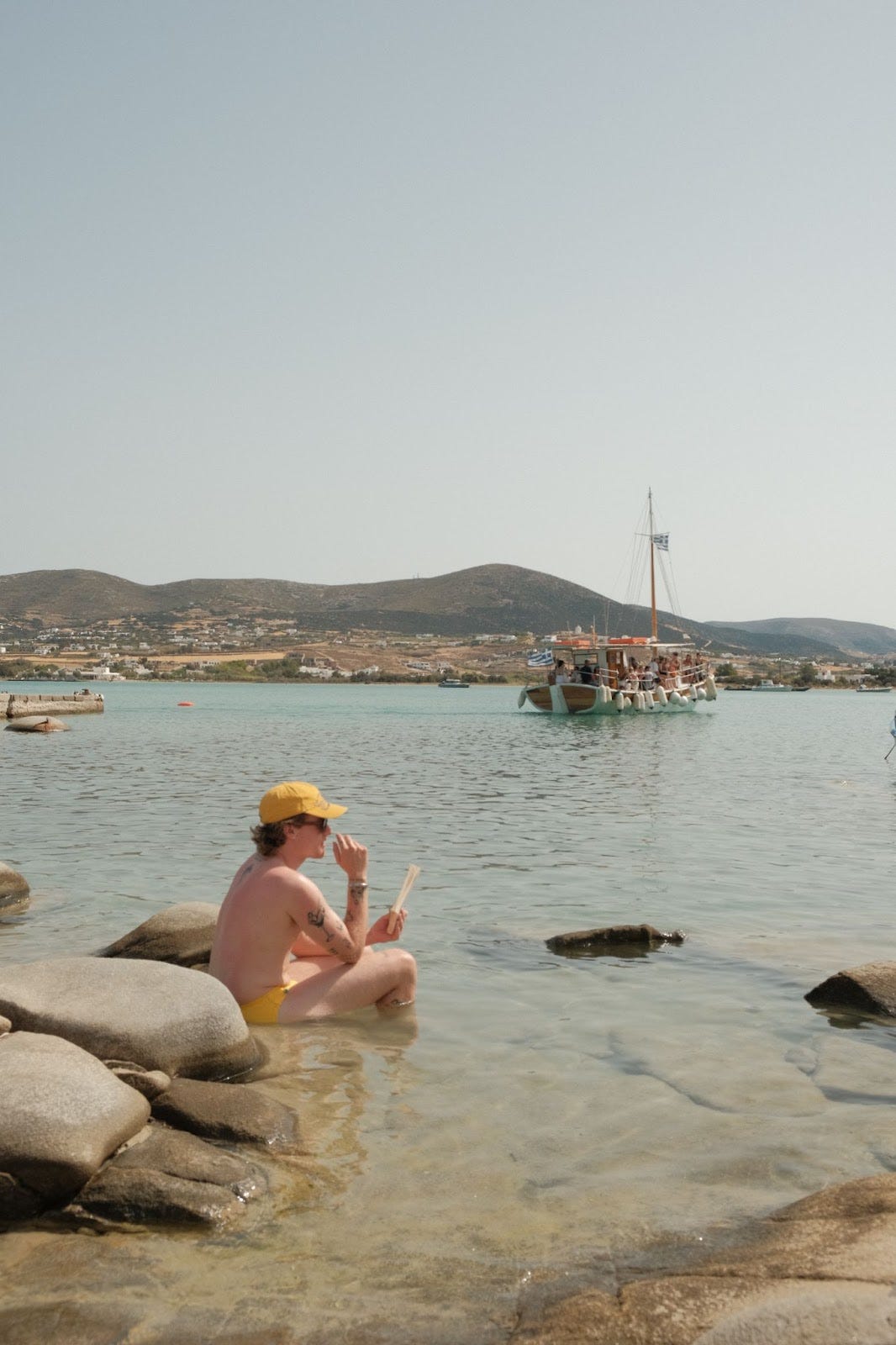
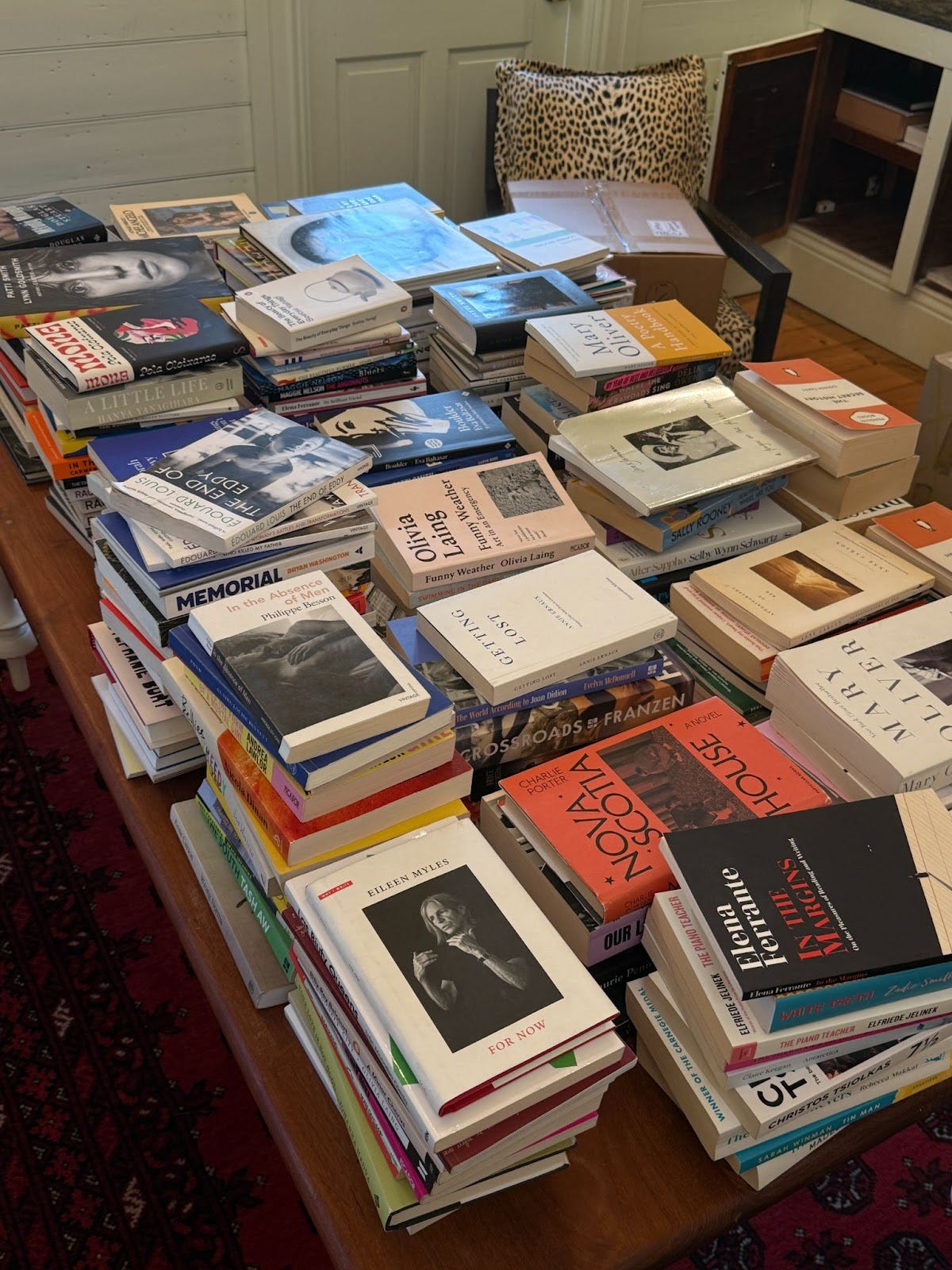
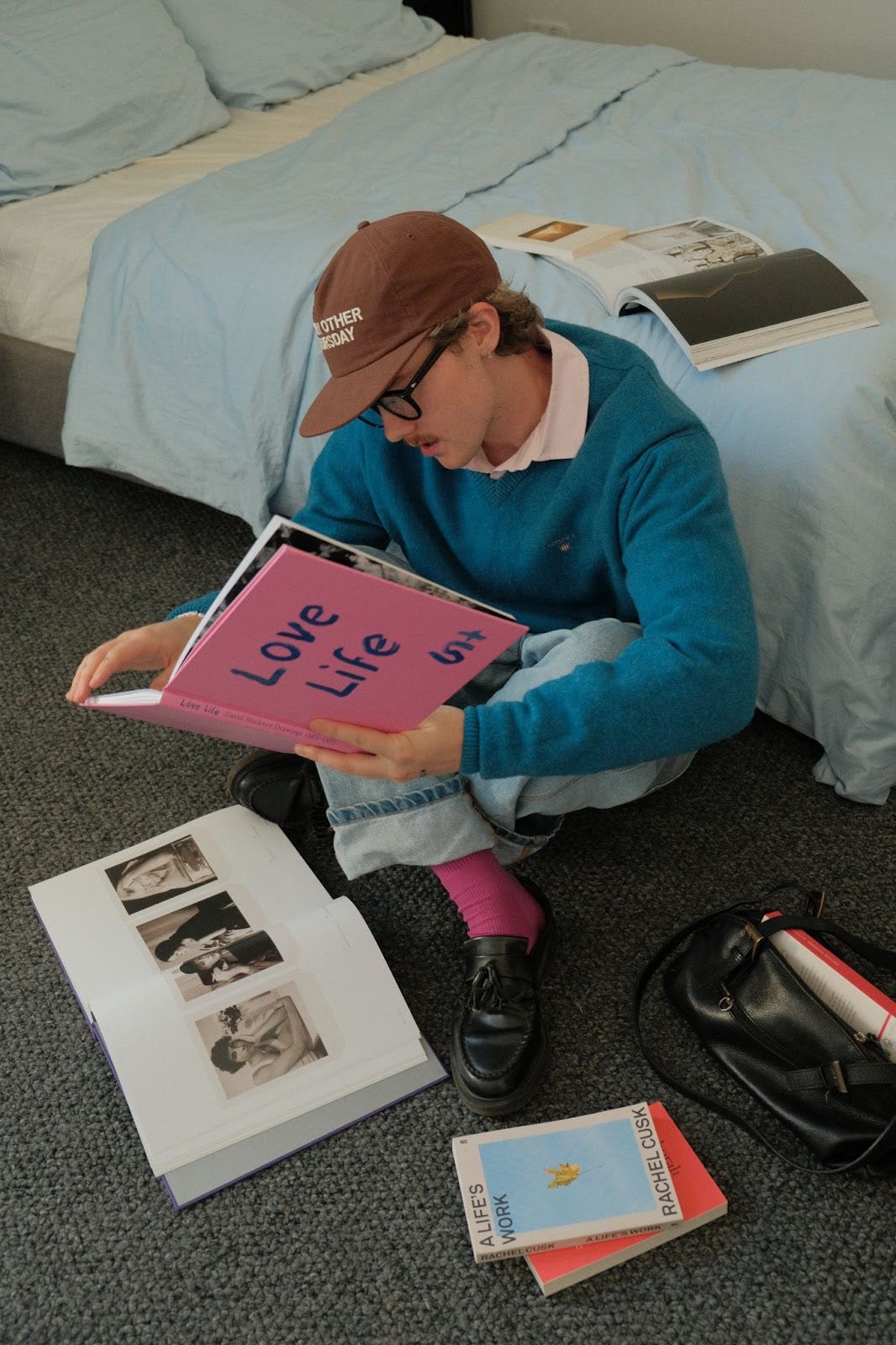

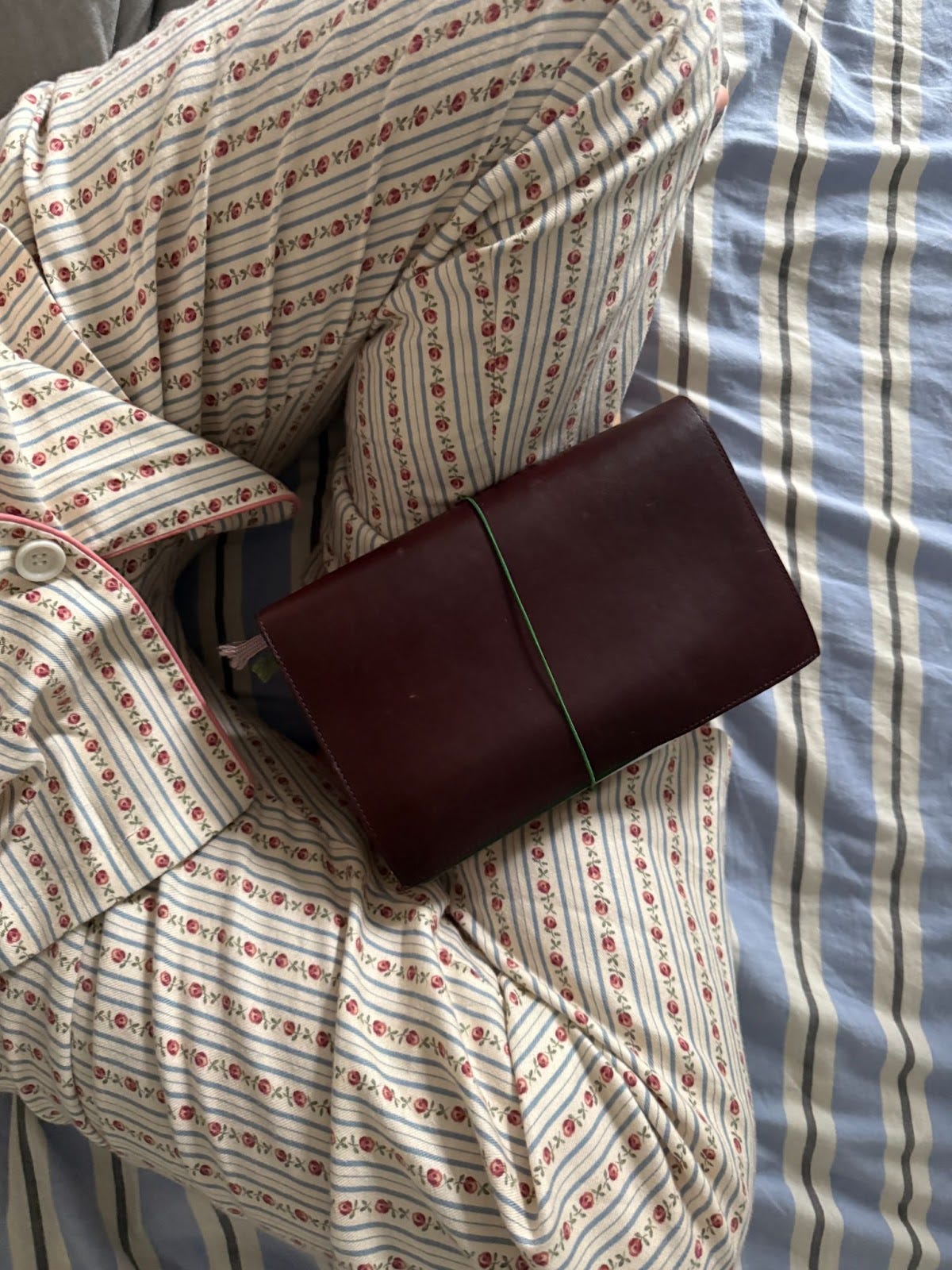
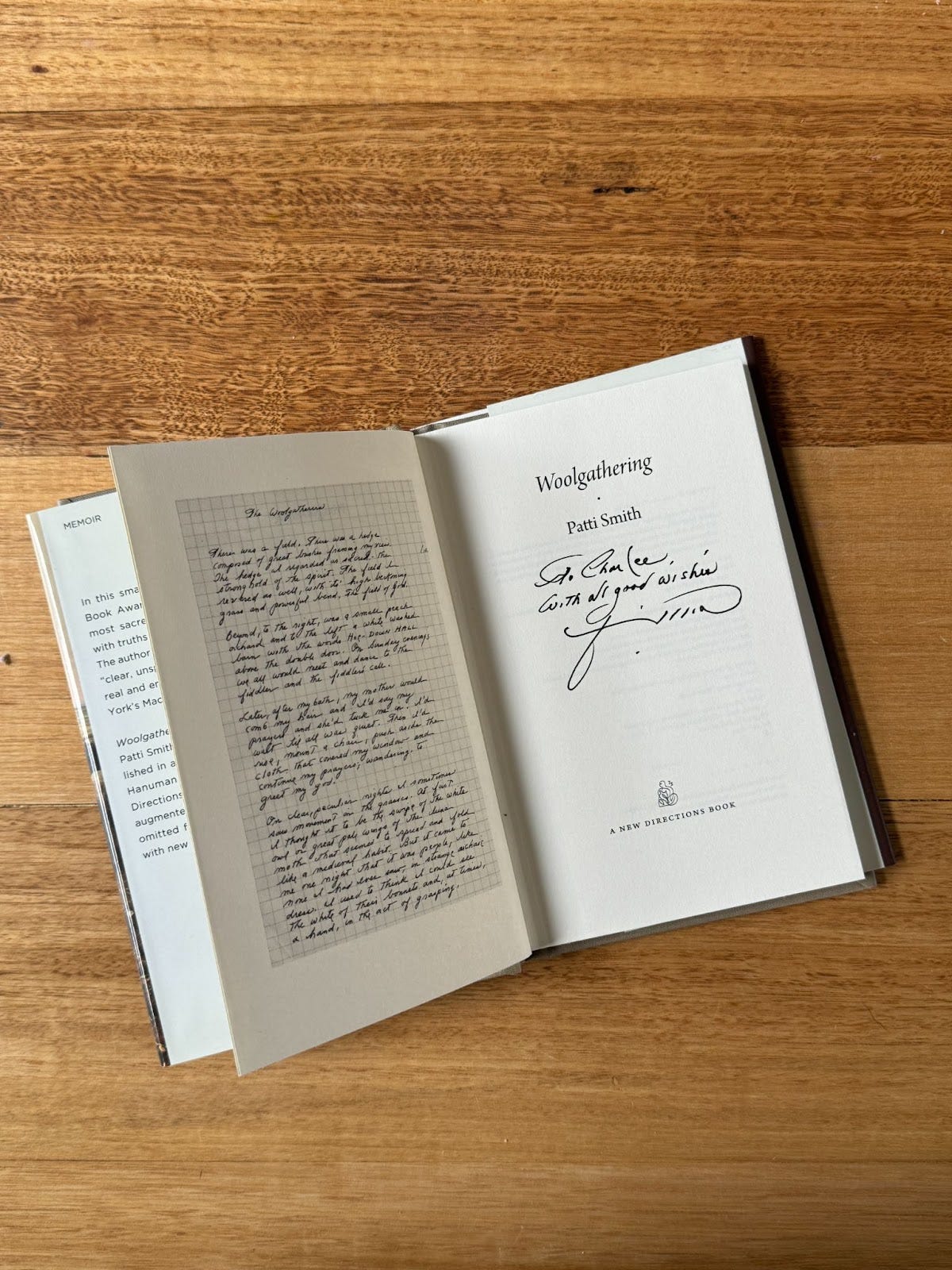


What a DELIGHT!!! That bookshop looks like something out of a movie set. Charlee’s life sounds so beautiful. I’ve also started keeping track of the books I’ve read analog style and I’ve been loving it. I still screenshot titles for my TBR and keep them in an album on my phone for reference but the books I’ve finished go in the notebook. It feels like such an accomplishment when I write another title on the page.
I used to be Team Pristine but as I’ve grown older, I’m all about mauling my books. Especially the paperbacks. I underline, highlight, dog ear when my tabs are not near. 🤩🧟♀️
I love this post. I love this substack. ❤️ I look forward to reading anything you write. Literally anything.